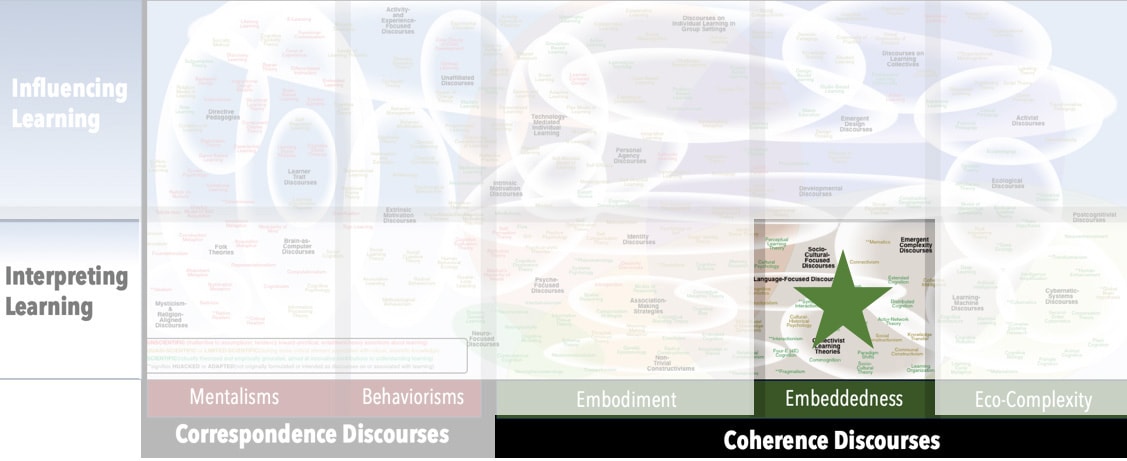Focus
Agents incorporating physical and social worlds in extended cognitive systemsPrincipal Metaphors
- Knowledge is … repertoire of possibilities ((((of an agent) in a social corpus) in the body politic) in the physical world)
- Knowing is … appropriate acting
- Learner is … individual-with-tools-for-thinking
- Learning is … expanding/elaborating possibilities (in part through extending into and engaging with social and material resources available in one’s environment)
- Teaching is … co-participating in learning
Originated
1980sSynopsis
Distributed Cognition is a framework for studying the ways that humans use social and technological means to off-load some of their thinking. It is evident is something as simple as writing out a shopping list. In this frame, “cognition” is understood to extend across members of a social group and to be invested in physical artefacts and environments. That is, the social and material worlds that humans structure around themselves – comprising relationships, symbol systems, tools, and so on – are not just the products of their cognition; they are aspects of their cognition. Associated constructs and discourses include:- Cognitive Artifacts (Donald Norman, 1990s) – collectively developed tools/technologies that enable thinking, such as language and mathematics. Along with Physical Artifacts, they are seen as both products of and amplifiers of intelligence.
- Cognitive Offloading – any act that reduces the mental demands of a task, such as making lists, taking pictures, or asking others to help keep track of details
- Dynamic Network Theory (James Westaby, 2010s) – an elaboration of Behavioral Reasoning Theory (see Choice Learning) that extends analyses into social networks, offering principles and tools to identify and interpret the individual and interpersonal dynamics that shape collective action and possibility. Important elements of the discourse include:
- Social Network Roles (James Westaby, 2010s) – a taxonomy of eight modes of engagement in social affairs, out of which collective activity and possibility are suggested to emerge: Goal Striving; System Supporting; Goal Preventing; Supportive Resisting; System Negating; Constructive System Reacting; Observing; Interacting
- Physical Artifacts (Donald Norman, 1990s) – material objects and technologies that enable thinking, such as counters, crayons, and computers. Along with Cognitive Artifacts, they are seen as both products of and amplifiers of intelligence.
- Social Network Analysis (2000s) – the use of Network Theory (see Complex Systems Research) for the analysis and representation of social structures. Among its many applications, Social Network Analysis can be used to interpret the nature and extent of different belief and value systems, as well as to appreciate the flow and influence of assumptions and ideas. Important constructs include:
- Group Network – in Social Network Analysis, the complete set of links among nodes (i.e., individuals) in a group
- Ego-Centered Network (Egocentric Network) – in Social Network Analysis, the subset of the Group Network that are linked to a specific node (i.e., individual)
- Technology – derived from the Greek tekhe “art, craft, skill,” Technology encompasses the ideas, practices, artifacts, and sensibilities that define a culture
Commentary
Distributed Cognition has been subject to surprisingly few criticisms. The most common ones tend to be launched from critics lodged in Folk Theories who cannot interrupt a naïve conviction that cognition is brain-based and bounded by the skin, much less that cognition might involve other cognitive systems.Authors and/or Prominent Influences
L.S. VygotskyStatus as a Theory of Learning
Distributed Cognition is a theory of learning.Status as a Theory of Teaching
Distributed Cognition is not a theory of teaching, but it is does serve as a powerful and useful interruption of many troublesome assumptions and practices that are rooted in the belief that cognition happens entirely in the head. The disruptive realization that technologies are a component of cognition prompts attentions to the sorts of vocabularies and artefacts that should be made available to enable possibility – as opposed to, for example, the sorts and extents of rote practice that will lodge necessary understandings in the agent’s head.Status as a Scientific Theory
Distributed Cognition can be appropriately described a scientific means of studying the complex and situated dynamics of learning. It is supported by methodologically robust research and has a substantial evidence base.Subdiscourses:
- Cognitive Artifacts
- Cognitive Offloading
- Dynamic Network Theory
- Ego-Centered Network (Egocentric Network)
- Group Network
- Physical Artifacts
- Social Network Analysis
- Social Network Roles
- Technology
Map Location

Please cite this article as:
Davis, B., & Francis, K. (2025). “Distributed Cognition” in Discourses on Learning in Education. https://learningdiscourses.com.
⇦ Back to Map
⇦ Back to List
